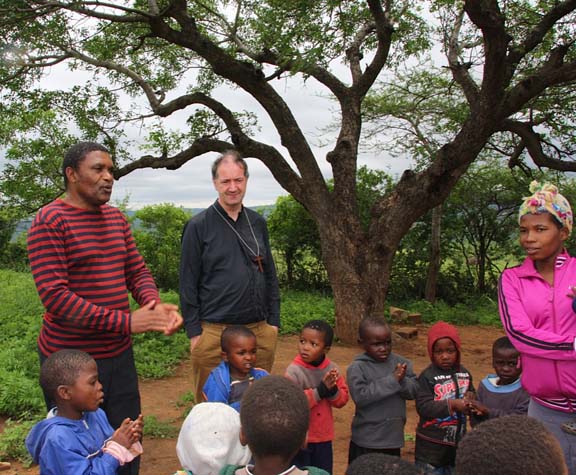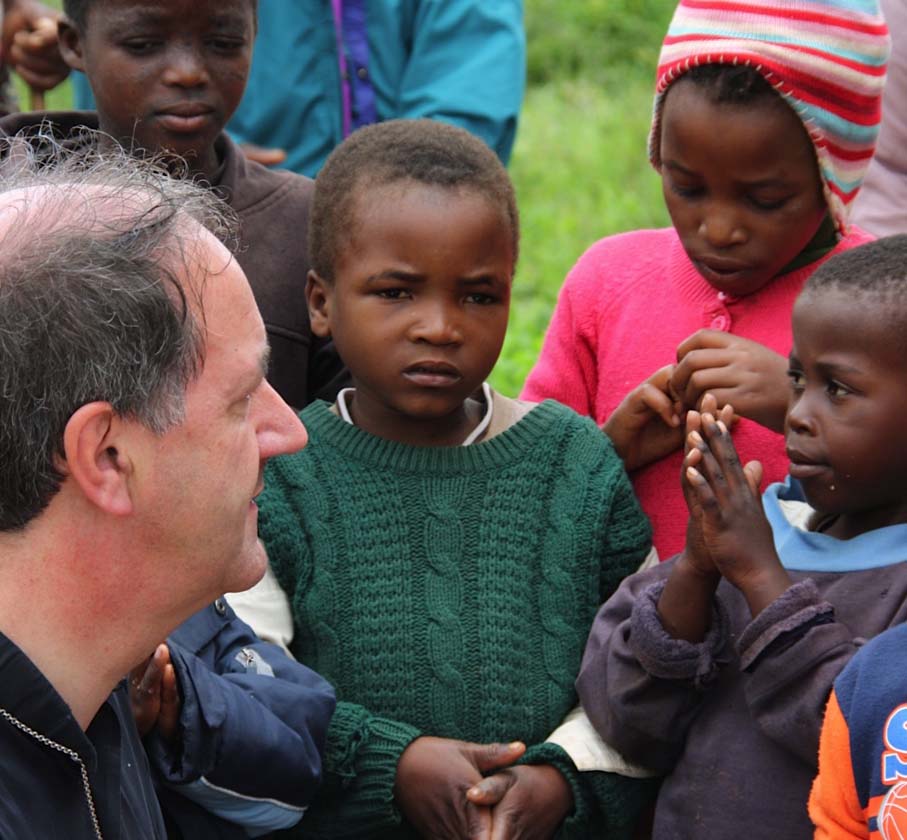SWAZILAND
Michael Burrows
Just before Christmas 2013, accompanied by Linda Chambers and Jan de Bruijn of Us. (formerly USPG) Ireland, my wife Claire, and my eleven year old son James, I visited the diocese of Swaziland to see for myself the work which Us. partners there with the bishop, clergy and people. In a sense it was a return visit; Bishop Ellinah had been in Ireland for the launch of the rebranded Us. in May and had also visited the diocese of Cashel, Ferns and Ossory. We confirmed together at Rathdowney in Co Laois, where I joyfully introduced her as Africa’s first female bishop, implying I think that it was likely to be some time yet before witnessing women bishops confirming in Ireland became more usual. I could not have believed that it would become a reality in the part of Laois that lies within Meath and Kildare in a matter of months!
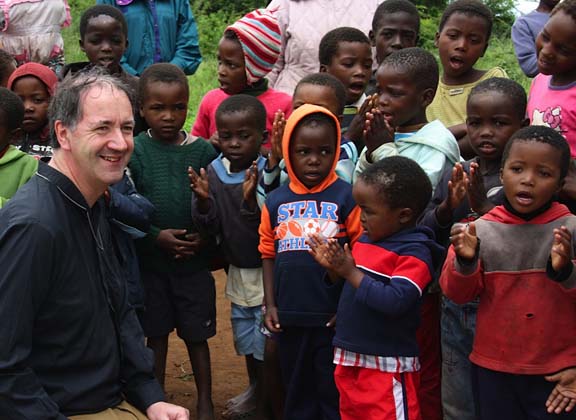 Swaziland is a small, yet varied and extremely beautiful kingdom, rightly renowned for its game parks and wildlife, sandwiched between Mozambique and South Africa. Our journey there thus involved the interesting experience of driving through South Africa in the days of mourning which followed the death of Nelson Mandela. We had a hectic programme over eight days; I certainly spoke on more occasions than I can number and relished in particular the vibrant experience of liturgy. Such is the heritage of that part of the Anglican world that worship brings together a very devout and catholic approach to the celebration of the Eucharist with passionate evangelical-style preaching and lively music during which those who like me have a phobia regarding dancing quickly feel most inadequate.
Swaziland is a small, yet varied and extremely beautiful kingdom, rightly renowned for its game parks and wildlife, sandwiched between Mozambique and South Africa. Our journey there thus involved the interesting experience of driving through South Africa in the days of mourning which followed the death of Nelson Mandela. We had a hectic programme over eight days; I certainly spoke on more occasions than I can number and relished in particular the vibrant experience of liturgy. Such is the heritage of that part of the Anglican world that worship brings together a very devout and catholic approach to the celebration of the Eucharist with passionate evangelical-style preaching and lively music during which those who like me have a phobia regarding dancing quickly feel most inadequate.
It is a country where the contrasts between rich and poor are huge and troubling; we shared a table with a government minister and visited remote feeding stations where parish clergy preside over the administration of free meals cooked in the open air to people who are utterly dependent on that food and walk long distances to get it. We drove off-road with voluntary lay pastoral workers visiting church members who were seriously ill or housebound in the most basic of homesteads. Everywhere there seemed to be children, gathering to greet us, singing, selling hot corn on the cob, playing football.
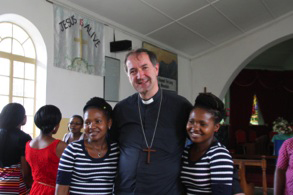 Indeed there was a particular emphasis on children and the young throughout our visit. We travelled, again off-road, to remote Anglican primary schools to which hundreds of beautifully clad yet very poor children walk long distances daily. We were entertained with their marvellous music and dance; we brought them little gifts of pencil cases from Ireland to encourage their studies. We saw the visible results of the support of the Church of Ireland for the work of the diocese through its schools – home economics equipment of a very basic but much needed kind from Kilkenny College, library materials from Rossorry in Clogher, a school kitchen which had been constructed by visitors from Rathfarnham in Dublin.
Indeed there was a particular emphasis on children and the young throughout our visit. We travelled, again off-road, to remote Anglican primary schools to which hundreds of beautifully clad yet very poor children walk long distances daily. We were entertained with their marvellous music and dance; we brought them little gifts of pencil cases from Ireland to encourage their studies. We saw the visible results of the support of the Church of Ireland for the work of the diocese through its schools – home economics equipment of a very basic but much needed kind from Kilkenny College, library materials from Rossorry in Clogher, a school kitchen which had been constructed by visitors from Rathfarnham in Dublin.
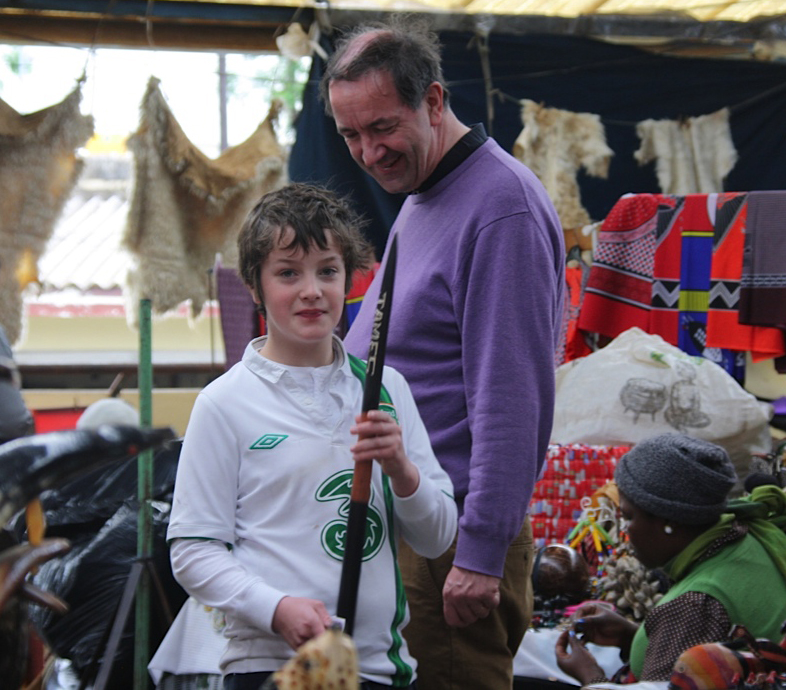 Schools are indeed basic (classrooms have little furnishing beyond tables, chairs and a blackboard) but teachers are highly gifted and motivated. I had the opportunity of addressing the principals of all the diocesan primary schools during a planning day which coincided with my visit. A huge responsibility for schools is the daily provision of nutritious cooked food for children who utterly depend on this for their main meal. Us. is striving to assist the diocese in providing a system by which the schools can work together to ensure they have a reliable and sustainable food supply at a reasonable price. I became hugely enlightened about the more technical nature of school cookery – how vast cauldron-like pots capable of feeding hundreds are heated over various forms of wood – burning stoves, and about new brands of stoves which will significantly reduce fuel consumption.
Schools are indeed basic (classrooms have little furnishing beyond tables, chairs and a blackboard) but teachers are highly gifted and motivated. I had the opportunity of addressing the principals of all the diocesan primary schools during a planning day which coincided with my visit. A huge responsibility for schools is the daily provision of nutritious cooked food for children who utterly depend on this for their main meal. Us. is striving to assist the diocese in providing a system by which the schools can work together to ensure they have a reliable and sustainable food supply at a reasonable price. I became hugely enlightened about the more technical nature of school cookery – how vast cauldron-like pots capable of feeding hundreds are heated over various forms of wood – burning stoves, and about new brands of stoves which will significantly reduce fuel consumption.
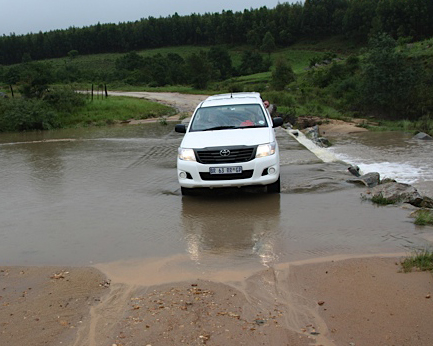 I also had a chance to address a gathering of the diocesan youth leaders. More and more one became aware of the most basic challenge facing Swaziland, namely the very high rate of AIDS / HIV infection which affects close on half of the population. All over the country there are large and unambiguous billboards about safe sex, and one can help oneself to free condoms at the border posts on entry. However, healthcare remains very basic except for the rich, and many teenagers are AIDS orphans – their parents have died and while they are still at school themselves they also are responsible for the care and nutrition of younger siblings. Hence the huge importance of feeding, cookery and nutrition in the context of basic education.
I also had a chance to address a gathering of the diocesan youth leaders. More and more one became aware of the most basic challenge facing Swaziland, namely the very high rate of AIDS / HIV infection which affects close on half of the population. All over the country there are large and unambiguous billboards about safe sex, and one can help oneself to free condoms at the border posts on entry. However, healthcare remains very basic except for the rich, and many teenagers are AIDS orphans – their parents have died and while they are still at school themselves they also are responsible for the care and nutrition of younger siblings. Hence the huge importance of feeding, cookery and nutrition in the context of basic education.
One of the ways in which the diocese is fortunate is that for historical reasons it possesses significant amounts of land, now being creatively brought into use for the production of vegetables and the promotion of good horticultural techniques. This is notably being done at the diocesan farm at Luyengo, in the development and initial management of which US. Ireland has played a vital role, and which has been notably supported by the diocese of Limerick and Killaloe. The farm includes a dam/artificial lake; a memorable moment of my visit was throwing in the first fish by which it is hoped it will become successfully stocked!
It was altogether a wonderful experience among warm, positive, determined people – led by a bishop of singular shrewdness and charm who came to the episcopate after a professional career as a town planner and who brings to her ministry characteristic gifts of clear and strategic thinking. One has to feel that the partnership between Ireland and the diocese of Swaziland is in good hands largely thanks to her presence – she has enormous warmth but does not suffer inefficiency at all gladly!
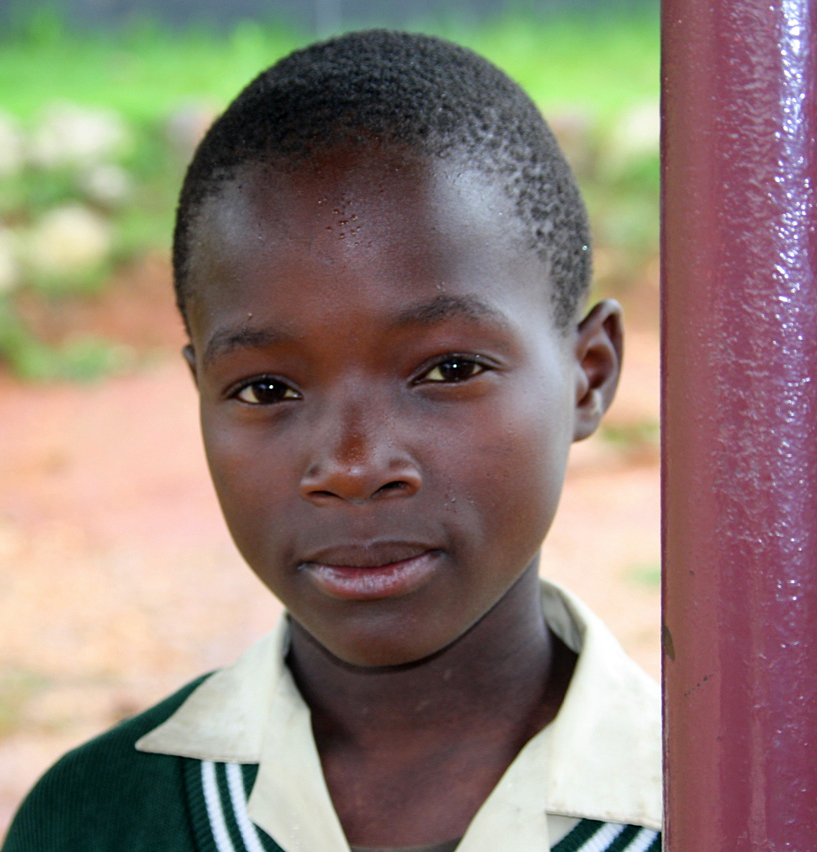 But I conclude with two final impressions. For several days I could not work out something that was troubling me, that made me feel out of place despite the warmth of the welcome. And then the proverbial penny or cent dropped and I realised that in Swaziland I, at 52, am a very old man – for males who survive infancy, given the level of HIV and the general state of healthcare, life expectancy is somewhere in the mid forties. I had never really thought before about how that reality must alter one’s whole perspective on life, making one surely more spiritually focused and conscious of vulnerability. I have actually come home with a heightened gratitude for my own gift of life in this fragile world, and for the most apparently ordinary of blessings. Being amidst the human travails of Swaziland instilled in me anew that most central of Eucharistic insights – ‘In everything give thanks’.
But I conclude with two final impressions. For several days I could not work out something that was troubling me, that made me feel out of place despite the warmth of the welcome. And then the proverbial penny or cent dropped and I realised that in Swaziland I, at 52, am a very old man – for males who survive infancy, given the level of HIV and the general state of healthcare, life expectancy is somewhere in the mid forties. I had never really thought before about how that reality must alter one’s whole perspective on life, making one surely more spiritually focused and conscious of vulnerability. I have actually come home with a heightened gratitude for my own gift of life in this fragile world, and for the most apparently ordinary of blessings. Being amidst the human travails of Swaziland instilled in me anew that most central of Eucharistic insights – ‘In everything give thanks’.
Secondly, we decided to bring our youngest son James with us – he was kindly released from primary school in Kilkenny in order to travel! I think I was moved by watching a child react to the mixture of experiences shared with him by other children without any inhibition – their joy, poverty, dynamism, simplicity, even hunger. James unlike his father is a soccer fanatic and he from his own limited means decided to bring a football to present to every school we visited – it was always a moment of fun when each football was revealed. But more seriously, I think I saw the kingdom of God in Swaziland more authentically because I could view it with the assistance and the freshness of a child’s eyes. And in such eyes there is I think never judgement and always hope.
My own diocese of Cashel, Ferns and Ossory has been generous in its support of, in particular, the schools of Swaziland diocese in recent years and I hope my hands-on experience and renewed enthusiasm for the work will enable the partnership to grow. We have so much in common, so much possibility of mutual and prayerful enrichment. Whether our discipleship is lived out in the contexts of farming, education, ministry, healthcare or whatever – within the global village the Irish and the Swazis have much to talk about, and as two little countries in our respective continents an obvious incentive to be friends.
—————-

